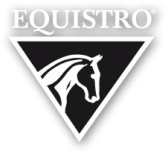
Vitamin B12 (cobalamin)
Sources
Healthy adult horses are able to synthesize b-complex vitamins in sufficient quantities via the bacteria in the large intestine (colon). The gut bacteria require the essential trace element cobalt for the synthesis of vitamin B12.
In comparison to all other B-complex vitamins, the horse's organism is able to store small amounts of cobalamin in their liver.
Requirements
Healthy adult horses normally are able to cover their daily needs by microbiological activity of their hind gut bacteria when fed enough amounts of cobalt.
Deficiency
Moldy hay, rations low in crude fiber, sudden feed changes or oral application of medications with a bacteriostatic effect can in principle result in a deficiency of B-complex vitamins.
If low synthesis of the intestinal flora is to be feared with rations rich in concentrated feed and low in crude fiber (e.g., in high-performance horses), a supplementation of b-complex vitamins should be considered.
Excess
Due to the fact that healthy adult horses are able to synthesize the required amounts of several b-complex vitamins, an excecss is very unlikely and only may occur with a very low likelyhood after heavy abuse of b-complex vitamin enriched supplements.
When problems may occur?
In skinny, anemic horses, additional doses of vitamin B12 can promote blood formation.
If newborn foals are not sufficiently supplied with vitamin B12 via the mother's milk if the mother mare is deficient in cobalt or vitamin B12, a deficiency can occur, which can result in delayed blood and cell formation and thus reduced growth.
Adult horses in training on high-grain rations may need dietary vitamin B12 supplementation because a decline in appetite shown by such horses may reflect a build-up of blood propionate. The propionate is produced in greater quantity when diets of this type are consumed, and its metabolism requires consumption of vitamin B12.



